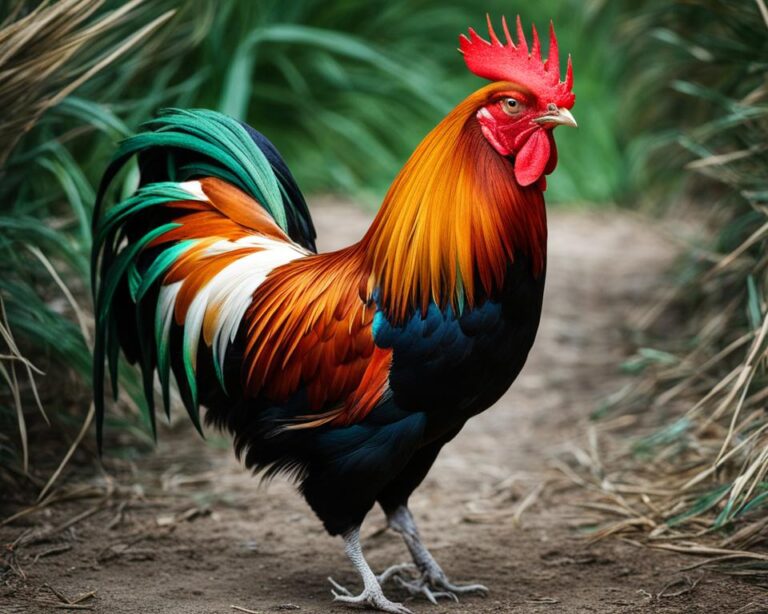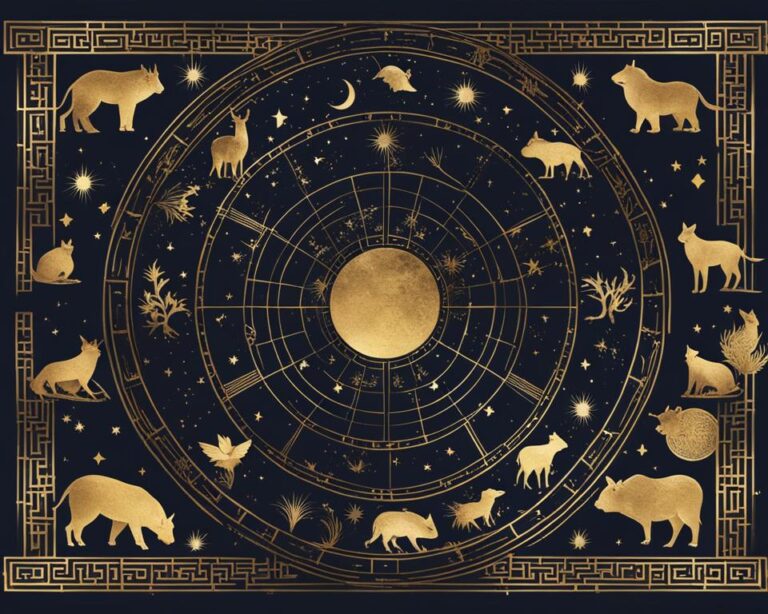Snake Sign in the Chinese Zodiac – Mystery and Wisdom: The Snake sign holds a significant place in the Chinese Zodiac, known for its air of mystery and wisdom. Often referred to as the “Little Dragon,” the Snake is closely associated with shedding its skin on the Dragon Head Raising Day. In Chinese culture, the Snake and the Dragon have distinct differences, with the Dragon symbolizing power and greatness, while the Snake is often seen as sinister, indifferent, and crafty. However, the Snake carries positive symbolic meanings, too, including luck, authority, the pursuit of love and happiness, as well as longevity and fortune.
Key Takeaways:
- The Snake is a significant sign in the Chinese Zodiac, known for its mystery and wisdom.
- There are differences between the Snake and the Dragon in Chinese culture, with the Snake associated with sinisterness and indifference.
- The Snake is considered mysterious due to its ability to move without leaving a trace and is worshipped as a god.
- The Snake symbolizes craftiness, originating from its portrayal in the Bible as the craftiest creature.
- The Snake also represents luck, authority, the pursuit of love and happiness, as well as longevity and fortune.
Differences Between Snakes and Dragons in Chinese Culture
While both the Snake and the Dragon hold significant positions in Chinese culture, they have distinct symbolic meanings. The Dragon is revered for its representation of power and nobleness, symbolizing greatness and success. In contrast, the Snake is associated with sinisterness and indifference.
The Snake is often regarded as mysterious and enigmatic, worshipped as a god due to its elusive nature. It is believed to possess the ability to move without feet, approach without casting a shadow, and leave without leaving a trace. In Chinese culture, the Snake is also associated with craftiness, deriving from the portrayal of the Snake as the craftiest creature in the Bible.
Despite the negative connotations, the Snake carries positive symbolic meanings as well. It is seen as a symbol of luck, authority, and the pursuit of love and happiness. The Snake’s association with longevity and fortune further enhances its positive symbolism in Chinese culture.
| Snakes | Dragons |
|---|---|
| Sinisterness and indifference | Power and nobleness |
| Mysterious and enigmatic | Greatness and success |
| Craftiness | |
| Luck and authority |
Understanding the differences between the symbolic meanings of Snakes and Dragons provides insight into the rich tapestry of beliefs and traditions within Chinese culture.
Symbolizing Sinisterness and Indifference
The Snake, as a symbol in Chinese culture, is often associated with sinisterness and indifference. This perception stems from the Snake’s cold-blooded nature and its lack of vocal cords, which makes it appear disinterested or apathetic. It reinforces the prejudice against this creature, as it is seen as mysterious and untrustworthy.
In Chinese literature, beautiful women who possess a crafty and ruthless nature are often referred to as “beautiful Snakes” in detective fiction. This association reinforces the idea that the Snake represents cunning and deceit. It highlights the belief that appearances can be deceiving and that one should be careful when dealing with individuals who exhibit charm and allure.
“Beautiful Snakes” are intriguing characters in detective novels, captivating readers with their enigmatic nature and ability to manipulate others for their gain. These characters represent the dark side of humanity, showcasing the Snake’s symbolic association with craftiness and deceit.
The Snake Sign Symbolic Meaning of Indifference
- Indifference in the Snake symbolizes the enigmatic nature of this creature.
- It reinforces the belief that the Snake is mysterious and untrustworthy.
- The lack of vocal cords adds to the perception of indifference.
- Beautiful Snakes in literature represent cunning and deceit.
The Symbolic Meaning of Sanke Sign Sinisterness
- Sinisterness in the Snake symbolizes its cold-blooded nature.
- It emphasizes the idea that appearances can be deceiving.
- The Snake is seen as mysterious and untrustworthy.
- Beautiful Snakes in literature represent individuals with charm and allure, hiding their deceitful nature.
Quote
“The Snake’s indifference and sinisterness make it a captivating symbol in Chinese culture. Its enigmatic nature and ability to manipulate others for its gain are showcased in detective novels through the character of ‘beautiful Snakes’.” – Anonymous
Symbolizing Mysteriousness

The Snake is considered mysterious in Chinese culture. It can move without feet, approach without casting a shadow, and leave without leaving a trace, adding to its enigmatic nature. The ancient people worshipped the Snake as a god because of its mystery and offered sacrifices to appease it. Various taboos regarding snakes have developed among different ethnic groups in China due to their mysteriousness.
| Taboo | Explanation |
|---|---|
| Don’t point at a snake with your finger | It is believed that pointing at a snake can anger it and bring bad luck. |
| Don’t kill or harm a snake. | Snakes are considered sacred creatures, and it is believed that killing or harming one can bring misfortune. |
| Don’t eat snakes. | Snake meat is believed to bring bad luck and is avoided in many Chinese cuisines. |
These taboos highlight the mysterious and revered status of snakes in Chinese culture. The snake’s ability to move stealthily and its association with the divine has made it a symbol of intrigue and fascination.
Symbolizing Craftiness

The Snake has a symbolic meaning of craftiness in Chinese culture. This symbolism originates from the Bible’s portrayal of the Snake as the craftiest creature. In the story of Adam and Eve, the Snake tempted Eve to eat the forbidden fruit, resulting in the concept of “original sin.” This association with cunning and deceit has led to the Snake being viewed as a crafty symbol in Chinese culture.
Despite its negative connotation, the Snake also holds positive symbolic meanings. In Chinese astrology, individuals born under the Snake sign are considered intelligent, resourceful, and quick-witted. They possess the ability to strategize and adapt to different situations, making them naturally crafty in a positive sense. The Snake’s craftiness is often seen as a desirable trait that can lead to success and prosperity.
“Craftiness is not always a negative quality. The Snake’s ability to navigate through complex situations with intelligence and intuition can be seen as a strength.”
Furthermore, the Snake’s craftiness is also associated with its ability to shed its skin. As the Snake grows, it must moult its old skin to make way for new growth. This process symbolizes transformation and renewal, highlighting the Snake’s adaptability and craftiness in reinventing itself.
In summary, while the Snake is often associated with craftiness and deceit, it is important to recognize the positive aspects of this symbolism. The Snake’s intelligence, resourcefulness, and ability to adapt make it a unique and revered symbol in Chinese culture.
Symbolizing Luck and Authority

The Snake holds a significant symbolic meaning in Chinese culture, representing both luck and authority. In ancient times, the Snake was believed to bring good fortune, and house snakes were considered a sign of luck and prosperity. The association of the Snake with luck is deeply ingrained in Chinese traditions and is still respected and honoured today.
In addition to luck, the Snake also symbolizes authority in Chinese culture. In ancient times, envoys would carry a sceptre adorned with two intricately carved snakes when sent on diplomatic missions. This symbolized their authority and power, emphasizing the importance and respect given to the Snake as a symbol of authority.
“The Snake’s association with authority showcases the deep-rooted belief in its power and influence within Chinese culture.”
Whether it be the belief in luck or the respect for authority, the Snake’s symbolic meaning in Chinese culture remains an essential and influential aspect of Chinese traditions and beliefs.
Snake Sign Symbolism in Chinese Culture
Snake symbolism is deeply intertwined with Chinese culture, representing various aspects of life. Let’s explore some other symbolic meanings associated with the Snake:
- The pursuit of love and happiness
- Longevity and fortune
- Mystery and wisdom
- Sinisterness and indifference
- Craftiness
These symbolic meanings contribute to a complex and multifaceted understanding of the Snake’s role in Chinese culture, highlighting its significance and impact throughout history.
| Symbolic Meaning | Snake Significance |
|---|---|
| Luck | The Snake is believed to bring good fortune and is associated with luck and prosperity in Chinese culture. |
| Authority | The Snake symbolizes authority and power, as seen in ancient Chinese traditions and rituals. |
| The pursuit of love and happiness | The Snake’s association with romance and pursuit of love is showcased in famous Chinese love stories and folklore. |
| Longevity and fortune | The Snake is believed to bring longevity and fortune, attracting positive energies and blessings. |
| Mystery and wisdom | The enigmatic nature of the Snake sparks curiosity and is associated with wisdom and deep understanding. |
| Sinisterness and indifference | The Snake is sometimes associated with sinisterness and indifference due to its cold-blooded nature and lack of vocal cords. |
| Craftiness | The Snake’s reputation for craftiness stems from various cultural references, including the Bible’s portrayal of the Snake as a crafty creature. |
These symbolic meanings offer a glimpse into the rich tapestry of beliefs and traditions within the Chinese Zodiac, providing insights into the profound influence of the Snake in Chinese culture.
Symbolizing the Pursuit of Love and Happiness
The Snake sign in the Chinese Zodiac has a positive symbolic meaning when it comes to the pursuit of love and happiness. This is beautifully exemplified in the famous Chinese love story, The Tale of the White Snake. In this enduring tale, the Snake character, Bai Suzhen, falls in love with Xu Xian, a mortal man, and their love story becomes an enchanting journey of devotion and happiness.
Throughout the story, Bai Suzhen demonstrates unwavering determination in her pursuit of love and happiness. She faces countless obstacles and sacrifices, yet her love for Xu Xian remains steadfast. This portrayal of the Snake highlights its ability to navigate the complexities of relationships and overcome challenges to find true joy.
Furthermore, the Snake’s association with the pursuit of love and happiness extends beyond folklore and into the realm of personal relationships. People born under the Snake sign are believed to possess a deep yearning for love and seek fulfilling, harmonious partnerships. They prioritize emotional connection and are often driven to create a blissful life filled with love, joy, and contentment.
| Snake Zodiac Compatibility | Compatible Signs |
|---|---|
| Dragon | Rat |
| Rooster | Ox |
| Monkey | Tiger |
Table: Snake Zodiac Compatibility
According to Chinese astrology, there are certain zodiac signs that have a strong compatibility with the Snake sign. These compatible signs, such as the Dragon, Rat, Rooster, Ox, Monkey, and Tiger, share similar traits and values, creating a harmonious bond with the Snake. This compatibility enhances the Snake’s pursuit of love and happiness, as it aligns with individuals who can support and understand their desires.
In conclusion, the Snake sign in the Chinese Zodiac embodies the pursuit of love and happiness. Through the tale of Bai Suzhen in The Tale of the White Snake and the compatibility with specific zodiac signs, the Snake symbolizes the deep longing for love and fulfillment. People born under this sign carry the essence of the Snake’s pursuit within them, seeking joy and contentment in their relationships and lives.
Snake Sign Conclusion
The Snake sign in the Chinese Zodiac embodies a captivating blend of mystery and wisdom. It holds a prominent place in Chinese culture, where it is known as the Little Dragon due to its shedding of skin on the auspicious Dragon Head Raising Day. While the Snake is often associated with sinisterness, indifference, and craftiness, it also carries positive symbolic meanings.
In Chinese culture, the Snake is considered a symbol of luck, authority, and the pursuit of love and happiness. Its enigmatic nature, mysterious movements without feet, and ability to leave no trace have led ancient people to worship the Snake as a god. Despite the prejudice against the Snake’s indifference and craftiness, it is still revered for its association with fortune, longevity, and the pursuit of love.
Exploring the symbolism and traits of the Snake sign provides a fascinating glimpse into Chinese culture and the intricate web of beliefs and traditions within the Chinese Zodiac. Whether contemplating the Snake’s mysteries, seeking luck and authority, or embarking on a quest for love and happiness, the Snake sign offers an intricate tapestry of symbolism and wisdom to unravel.
FAQ
What is the significance of the Snake in the Chinese Zodiac?
The Snake is a significant sign in the Chinese Zodiac, often associated with mystery and wisdom. It carries both positive and negative symbolic meanings, including luck, authority, the pursuit of love and happiness, as well as sinisterness, indifference, and craftiness.
How is the Snake different from the Dragon in Chinese culture?
The Snake and the Dragon have distinct symbolic meanings in Chinese culture. The Dragon represents power and greatness, while the Snake is often associated with sinisterness, indifference, and craftiness. The Snake is also worshipped as a god due to its enigmatic nature.
Why is the Snake Sign associated with sinisterness and indifference?
The Snake is perceived as indifferent due to its cold-blooded nature and lack of vocal cords. Women who are beautiful in appearance but have a crafty and ruthless nature are often referred to as “beautiful Snakes” in detective fictions.
What makes the Snake Sign mysterious in Chinese culture?
The Snake is considered mysterious because it can move without feet, approach without casting a shadow, and leave without leaving a trace. Ancient people worshipped the Snake as a god because of its enigmatic nature and offered sacrifices to appease it.
What is the symbolic meaning of craftiness associated with the Snake Sign?
The Snake’s symbolic meaning of craftiness originates from the Bible’s portrayal of the Snake as the craftiest creature. The Snake is known for luring Eve to eat the forbidden fruit, resulting in “original sin.” However, the Snake also holds positive symbolic meanings, such as luck, authority, the pursuit of love and happiness, longevity, and fortune.
Does the Snake symbolize anything else besides sinisterness and craftiness?
Yes, the Snake symbolizes luck and authority in Chinese culture. House snakes are considered lucky, and the Snake is also associated with state authority. Additionally, the Snake represents the pursuit of love and happiness, as demonstrated in the famous Chinese love story, The Tale of the White Snake.





